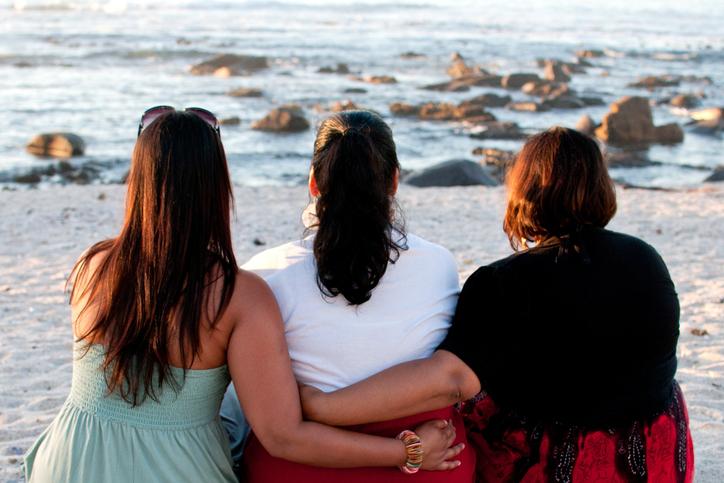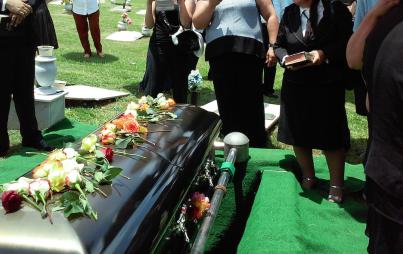
Whatever you do, be there - be present - for your friend.(Image Credit: Thinkstock)
It’s been four years since I gave birth to my daughter Margaret, and four years since she passed away. Since then, I’ve come to know a lot about what it means to lose a child. I know that there are many ways to be a loss parent, from experiencing a miscarriage, to losing a baby to prematurity as I did, to stillbirth and SIDS. I know that everyone grieves differently, and that everyone’s path after loss is unique.
I know that pregnancy and child loss is a problem that most folks know nothing about, until it happens to them or a loved one.
That last part is especially important, because roughly 1 in 4 pregnancies and births end in loss, which means you probably already know someone who has experienced this kind of pain, or will eventually. Before my loss, the only person I’d known to go through a loss via miscarriage was a close friend. I wasn’t sure how to react or what to do or how to be there for her. I offered my condolences, but that was the extent of it. Everything felt awkward, and I knew that I couldn’t really change the situation so I did nothing, and I still regret it.
When I lost my daughter, I was incredibly fortunate to have a solid support system. My brother helped in the preparations for our daughter’s cremation and memorial service. My parents spent weeks helping my husband and me out of the dark hole we’d fallen into, giving us space when we needed it, and hugs when we needed those, too. My closest friends all gave their condolences, sat by me, checked up on me.
When you lose a child, you no longer have the words to ask for help. It’s up to us on the outside to lend our support, and there are plenty of ways in which to do this:
Give Your Condolences.
This seems simple enough but you’d be surprised how many folks forget to do this simple thing. Whether it’s by sending a card or making a call, a loss parent will appreciate this gesture. Not only that, but we will always remember who was there and who disappeared because the topic was uncomfortable for them or because they didn’t realize the level of devastation the loss of a child can cause.
Watch What You Say.
Depending on the parent, certain phrases can sound insensitive, obnoxious, or downright insulting. As an agnostic-atheist, I never appreciated statements like, “She’s in a better place,” or “It’s in god’s hands” because they brought me no comfort. Every parent is different of course, but do steer clear from phrases like, “Everything happens for a reason,” because even the most devout person will tell you that when it comes to losing a child, it won’t make anyone feel better.
Drop Off Or Send Helpful Gifts.
When I lost Maggie, an old high school friend mailed me a special ornament for Christmas and it warmed my heart so much. Some parents will appreciate keepsakes like this, while others will be happy with something more practical. If your loved one has to miss work, chances are they will be hurting financially on top of their loss, so giving them a grocery or gas gift card can be extremely helpful and welcome. Loss moms might also appreciate a gift of No More Milk tea, which will suppress the body’s production of breast milk after loss, which can be extremely triggering.
Make Yourself Available.
No matter what, a loss parent needs to know that their friends are there for them. Let them know that you can drop by after work or that they can swing through on weekends. Invite them out, even if they continuously say no. Remind them that you’re thinking of them and that you’re there to talk if and/or when they need it.
Offer Knowledge If You Have It.
Before I lost my daughter, I knew very little about the world of child loss. These days I feel like I am nearing expert status. For example, did you know there is an organization that will take photos of your deceased child prior to their cremation or burial, free of charge? Or that there is a nonprofit that will create a teddy bear the same weight as the child you lost? If your friend is a mama, you can also prep her on what will occur to her body over the next few weeks, in the event no one else has prepared her for it.
Honor Their Baby’s Memory.
Find out if your friend will be holding a memorial of any kind and be present. If they decide to participate in a remembrance walk, offer to come along or help them make shirts. Light a candle for their baby and send them a photo of it. Make a donation in their baby’s name, and especially if it’s an organization that will help prevent other mothers going through a similar ordeal. And don’t be afraid to say their baby’s name — a simple but very real way to honor their memory.
Help Them Find Support.
Finding the right kind of support can be difficult when you find yourself overwhelmed with grief. I scoured the internet for a local support group but only found religious ones, which wasn’t for me. I wound up retreating to the internet and found a number of Facebook groups where I’d connect with hundreds of loss parents. If you know of groups, either local or online, share them with the parent. Gently suggest they speak with a therapist in order to offset anxiety, depression, and potential birth-related PTSD.
Listen, But Remember That Silence Can Be Golden, Too.
Most of the time, all that a loss parent needs is someone to talk to, and someone who will listen. Make sure your friend knows that you’re just the person they can speak with. But if the conversation quickly slows down and you’re unsure of what to say, don’t stress. The loss parent is probably just as unsure, and is merely happy to not be alone. Sharing in their grief by simply sitting in silence is one of the most helpful and powerful things you can do to support your loved one at this extremely difficult time.








